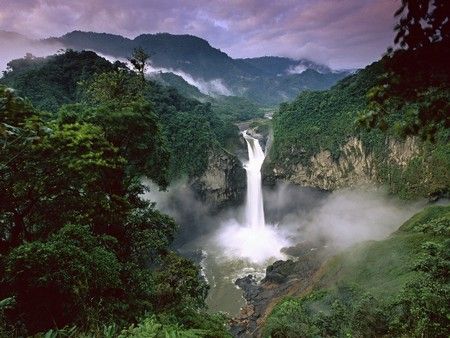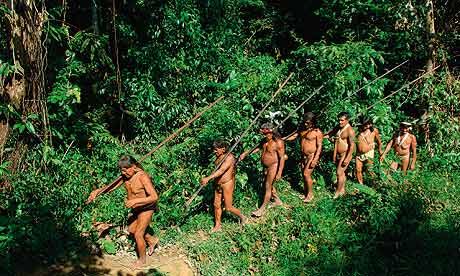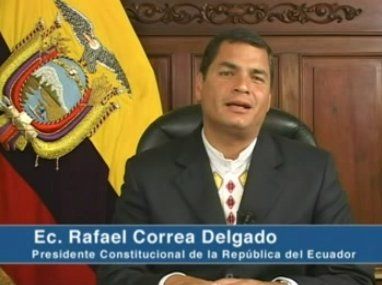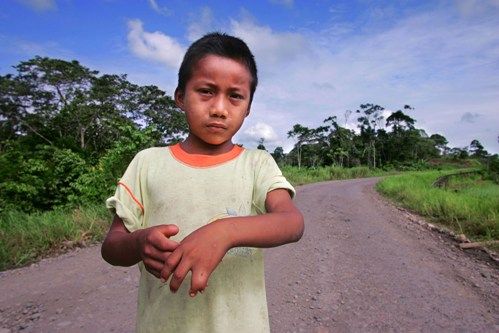It looks like you're using an Ad Blocker.
Please white-list or disable AboveTopSecret.com in your ad-blocking tool.
Thank you.
Some features of ATS will be disabled while you continue to use an ad-blocker.
share:
I bet this is one you didn't know about.
The article continues:
But here is the really controversial part:
So in other words, he wants the world to pay for their forbearance on the development of their natural resources.
Sticky stuff, huh?
Is this a hard reality, or a form of environmental blackmail?
Here is a promo video on the concept:
I have to be honest...there is something very creepy about this video. Maybe I've just become too cynical, but to me there is a very used-car-salesman quality to this pitch. What do you think?
[edit on 30-11-2009 by loam]
In the Ecuadorean Amazon basin our thirst for oil has triggered an eco-disaster: wholesale pollution and catastrophic cancer rates. And a bloody turf war has broken out.
Torrential rain has washed away the blood where the family fell under a hail of wooden spears. But memories of what happened this summer are still fresh in the minds of those who live and work here.
...on a morning in August, a 12-year-old girl, run through with two spears nearly 12ft in length, managed to stagger to the front gate of the drilling station to raise the alarm before she collapsed and died.
A short distance away, on a dirt track hidden from view by dense foliage, the bodies of her mother and 17-year-old brother were found by oil workers, pierced by more than a dozen similar spears. Her baby brother had been kidnapped. Before she died, the girl gave a description of their attackers: they were almost entirely naked.
From the shape of the spears and the coloured feathers on them, they have since been identified as almost certainly belonging to one of the world’s last known “uncontacted” tribes: the Taromenane.
In the whole of its history the tribe has never had any peaceful contact with the outside world, choosing to live totally isolated from civilization in this area of breathtaking beauty at the headwaters of the Amazon. They are supposed to be a protected people, but they are fighting for their survival and that of their ancestral land. It is a struggle with surprising implications for all of us.
...Oil exploration in the forest has encouraged illegal logging and colonization by poor Ecuadoreans from other parts of the country and led to clashes in which many innocent lives have been lost...
The article continues:
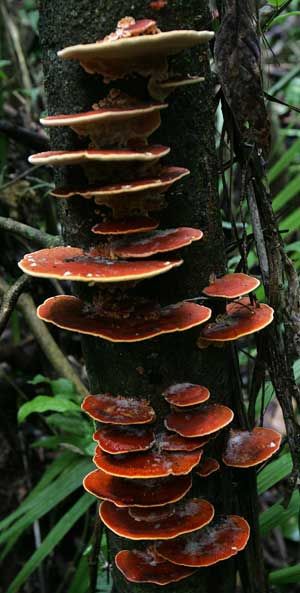
Close to Ecuador’s borders with Colombia and Peru, this swathe of territory — much of it now included in the Yasuni national park — is also at the forefront of another, global battle. Yasuni is home to a vast array of rare flora and fauna. It has the largest number of tree species per hectare in the world (more in just one hectare than the whole of North America), together with endangered monkeys, pumas and jaguars and 44% of the entire bird population of the Amazon basin stretching far beyond its borders. But beneath the surface is immense wealth of a different kind: more than a billion barrels of crude oil.
...
...the battle is raging for control of resources. Active drilling and oil production are taking place in several blocks of land, including one close to the heart of the park operated by the Spanish conglomerate Repsol and two in the northwest operated by the Chinese company Petro Oriental, which runs the drilling station where the Zavalas were killed. The family came from a small community of settlers, Los Reyes, that has sprung up close to the oil wells.
The Taromenane have killed settlers and illegal loggers before, in retaliation for attacks on their dwindling numbers. In 2003, 26 Taromenane women and children were ambushed and killed. Their attackers were never caught but are thought to have been Waorani, another, larger group of indigenous people, many of whom have been co-opted to work for the oil companies.
In an effort to protect the territory of these indigenous communities, the southern half of Yasuni and an area beyond was marked out two years ago as a so-called “untouchable zone” where they could continue their hunter-gatherer existence undisturbed. But the Taromenane have no way of knowing that such a zone exists, let alone its limits.
In line with official policy of not forcing contact with the Taromenane, no action was taken in the aftermath of the killing. (In the past, indigenous peoples have been decimated by diseases brought in through forced contact with the outside world.) “We don’t want to put these tribes in a crystal box and conserve them for eternity,” says a government spokesman, Eduardo Pichilingue. “We want to leave it up to them to decide how and when they change. They have that right.”
Instead of punishing the tribe, the government called for the Hormiguero Sur drilling station to be closed down. But as we stand talking to the guard there two months later, straining to make ourselves heard above the roar of a generator pumping oil, it is clear this order is being ignored. Attempts to challenge Petro Oriental executives at a nearby headquarters are met with indifference.
But here is the really controversial part:
Ecuador’s president, Rafael Correa, is promoting a plan he describes as “not only simple, but audacious and revolutionary”. In the run-up to next month’s UN climate-change conference in Copenhagen, he and his team have been circling the globe to drum up support for a scheme that would leave 850m barrels of oil in the eastern section of the park untouched underground.
In return for not pumping this oil, they are asking other countries to pay Ecuador $350m a year for the next 10 years to compensate for lost income. Correa’s plan is designed to preserve what is left of Yasuni’s unique biosphere and the territory of its indigenous people and would also prevent carbon-dioxide emissions caused by extracting and burning this oil — an estimated total of 410m metric tons of CO2.
So in other words, he wants the world to pay for their forbearance on the development of their natural resources.
Sticky stuff, huh?
So far only Germany has made a concrete effort to support Correa’s plan, offering to donate $50m a year for the next decade — on condition that an international trust fund be set up into which donor countries would pay money. All donors would receive “Yasuni bonds” guaranteeing that their contributions would be returned, with interest, if Ecuador were ever to tap the protected oil reserves. Spain, France and Italy have also expressed interest by cancelling debts owed by Ecuador. The British government has not yet been formally approached, but when Correa’s advisers were due to meet MPs earlier this year to discuss the plan, they were told that our parliamentarians were too busy dealing with the expenses scandal.
Correa has made it clear that if he does not get backing for his plan, he will be forced to allow further drilling in Yasuni. “Climate change has been produced principally by the rich countries,” he has said, “and they have a duty to take responsibility for that. What we are proposing is a constructive way to redress the imbalance and stop further polluting of the planet.”
Is this a hard reality, or a form of environmental blackmail?
Here is a promo video on the concept:
I have to be honest...there is something very creepy about this video. Maybe I've just become too cynical, but to me there is a very used-car-salesman quality to this pitch. What do you think?
[edit on 30-11-2009 by loam]
But read on:
What a mess.
See also:
A Rainforest Chernobyl
Live Yasuní
Diversity Of Trees In Ecuador's Amazon Rainforest Defies Simple Explanation
[edit on 29-11-2009 by loam]
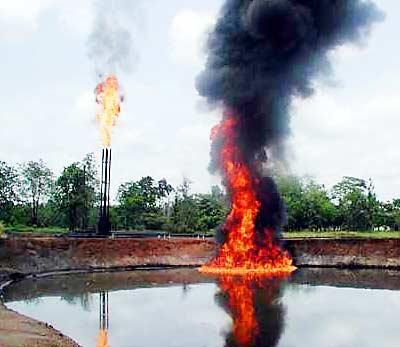
Stark evidence of the long-term destruction caused by oil companies in Ecuador’s Amazonian rainforest lies less than 100 miles northwest of Yasuni. In parts of the rainforest as yet untouched by the incessant search for oil, the song of rare birds and the screeching of monkeys fill the air. But close to the oil installations, the only signs of wildlife are the vultures circling on thermal currents above flare stacks burning off unwanted gas and emitting an acrid smell.
People in the sprawling area between the oil towns of Coca and Lago Agrio, which has been booming since the 1960s, have had a chilling foretaste of what others may face unless the drilling is contained. Here, in a region dubbed “the Rainforest Chernobyl”, decades of drilling by the American giant Texaco, taken over in 2001 by the Chevron Corporation, has led to toxic contamination over thousands of miles. Local communities are suffering catastrophic rates of cancer and other diseases, which has prompted a historic $27-billion court battle. If the 30,000 Ecuadorean plaintiffs are successful, legal history could be made, with the largest damages award ever handed down in an environmental case.
A few miles east of Coca lies the village of San Carlos. Most who live here came to the area in the 1970s to farm along routes cut through the rainforest as oil exploration began. There is little forest left now and little productive farming. Much of the land in this region that stretches north to the border with Colombia was long ago contaminated by millions of gallons of toxic waste, gas and crude oil released untreated into the environment. Most of the inhabitants have depended for decades on contaminated drinking water from polluted rivers and streams. Rates of cancer of all kinds are nearly four times higher than in areas where there is no oil drilling. The incidence of other illnesses such as skin and bone disease, respiratory and digestive problems and spontaneous abortions are also far higher. Most of the people living here have been dependent for decades on contaminated drinking water taken directly from polluted rivers and streams.
...
“Sixty-five per cent of the population around here are suffering from respiratory and gastric problems, skin disease and other illnesses,” says Rosa Moreno, a nurse who has been in the San Carlos area for 25 years. “We don’t have any specialist doctors to diagnose them properly or analyse the causes. But to anyone who lives round here it’s obvious that the problems are related to pollution caused by the oil companies.”
Walk anywhere near these waste pits and you still sink ankle-deep in tar. Other stretches of land that appear green move unnervingly underfoot; poke a stick through the grass and you simply find lakes of black sludge.
Last year a team of engineers, doctors and biologists submitted a court-ordered report, which concluded that Texaco had polluted streams and drinking water across an area of nearly 2,000 square miles, and caused 2,091 cases of cancer, leading to 1,401 deaths between 1985 and 1998. Chevron’s lawyers say the area’s health problems are caused only by poverty and poor sanitation.
Faced with the possibility of losing the legal battle and having to pay staggering levels of compensation, the company has now made moves to argue before an international court of arbitration in the Hague that the case against the oil companies in Ecuador has been unfair. The outcome is still uncertain: the judge in Ecuador is not due to hand down his judgment until next year.
What a mess.
See also:
A Rainforest Chernobyl
Live Yasuní
Diversity Of Trees In Ecuador's Amazon Rainforest Defies Simple Explanation
[edit on 29-11-2009 by loam]
The oil companies and the Govt. should leave these indigenous people and the area alone. I fully support the tribal people in this. The guys are
protecting their land and don't want interference of money, politics, corruption, waste of eco system.
reply to post by December_Rain
Of course, it seems all too late for that.
In fact, it's all about the money and politics now....
Of course, it seems all too late for that.
In fact, it's all about the money and politics now....
More info on the largest environmental lawsuit in human history:
(Both Sides)
(Both Sides)
The biggest environmental lawsuit ever ($27 billion), and hardly a glance...
Is this stuff just not interesting to anyone?
boycott oil!!! wait...
i wonder why these industries always seem to leave a barren wasteland behind anywhere they manage to gain a foothold. i bet there's more than just oil, must be toxic waste disposal or dirty mining in the mix if the health effects are an indication.
as for the reason why many threads don't receive an appropriate amount of attention, there's too much politics, too many scandal topics and so on, but that too is only going to get worse.
i wonder why these industries always seem to leave a barren wasteland behind anywhere they manage to gain a foothold. i bet there's more than just oil, must be toxic waste disposal or dirty mining in the mix if the health effects are an indication.
as for the reason why many threads don't receive an appropriate amount of attention, there's too much politics, too many scandal topics and so on, but that too is only going to get worse.
reply to post by Long Lance
I guess you're right. We're bursting at the seams with crisis issues...
We'll obsess about this one likely well after there is nothing we can do about it.
-sigh-
[edit on 2-12-2009 by loam]
I guess you're right. We're bursting at the seams with crisis issues...
We'll obsess about this one likely well after there is nothing we can do about it.
-sigh-
[edit on 2-12-2009 by loam]
Great, but very saddening post OP. S&F.
I hate it when I read this sort of thing. these people are wiser,more clever, more peaceful and more respectful than we will ever be.
yet these oil companies etc wade in without a damn care in the world. I hope some day they will learn of their bad ways and be held accountable.
Whos to know, maybe some day we could all use the help of some indigenous peoples for survival.
I hate it when I read this sort of thing. these people are wiser,more clever, more peaceful and more respectful than we will ever be.
yet these oil companies etc wade in without a damn care in the world. I hope some day they will learn of their bad ways and be held accountable.
Whos to know, maybe some day we could all use the help of some indigenous peoples for survival.
Originally posted by loam
The biggest environmental lawsuit ever ($27 billion), and hardly a glance...
Is this stuff just not interesting to anyone?
It seems people are more interested in how Obama pronounces Pakistan.
Very interesting information here, thanks for taking the time to put it together!
reply to post by loam
Thank you once again for taking time to make this thread. People are busy chasing hacked emails, Obama birth certificates etc. Real world is scary for many people. I hope these tribal people wins the their land back.
Thank you once again for taking time to make this thread. People are busy chasing hacked emails, Obama birth certificates etc. Real world is scary for many people. I hope these tribal people wins the their land back.
I hate to sound callous, but why the rest of the word should pay for pristine environment reserved in a particular spot where indigenous people happen
to live?
I invite the Ecuadorian government to step up with the money to buy land in upstate New York (which is still not polluted very much, it's a good buy) and give it back to Mohawks. Or whatever tribe they choose. They are also welcome to buy land in Long Island, we have a small Native American Nation here that will feel grateful.
I also want this Ecuadorian dude to extract and send back home every illegal immigrant of this country currently in the US, to their natural habitat. Until then, he should really shut up.
I invite the Ecuadorian government to step up with the money to buy land in upstate New York (which is still not polluted very much, it's a good buy) and give it back to Mohawks. Or whatever tribe they choose. They are also welcome to buy land in Long Island, we have a small Native American Nation here that will feel grateful.
I also want this Ecuadorian dude to extract and send back home every illegal immigrant of this country currently in the US, to their natural habitat. Until then, he should really shut up.
reply to post by buddhasystem
I don't think that sounds callous.
In fact, it really is a valid concern. In some respects, it's a bit like holding the environment hostage and for ransom. Moreover, if nations agree to pay in Copenhagen later this month, what guarantees will be made of enforcement? Hundreds of billions could be spent, and we still lose the zone to exploitation.
On a more general note, has anyone watch the trailer for CRUDE? Looks riveting.
Originally posted by buddhasystem
I hate to sound callous, but why the rest of the word should pay for pristine environment reserved in a particular spot where indigenous people happen to live?
I don't think that sounds callous.
In fact, it really is a valid concern. In some respects, it's a bit like holding the environment hostage and for ransom. Moreover, if nations agree to pay in Copenhagen later this month, what guarantees will be made of enforcement? Hundreds of billions could be spent, and we still lose the zone to exploitation.
On a more general note, has anyone watch the trailer for CRUDE? Looks riveting.
What exactly are we supposed to do about it? I could go and protest until the cows came home, but what good would it do? I could write my
politician, but the only paper they are interested in is green.. I would love to do something, but in reality, I can't help but wonder what options
I really have.
reply to post by Anjaba
What you could do is talk to people around you and make the aware. When enough people know about it, the Govt. will be forced to do something.
What you could do is talk to people around you and make the aware. When enough people know about it, the Govt. will be forced to do something.
reply to post by December_Rain
I inform as many people as I can on a day to day basis. Most people just don't care about any other country's welfare, but I still do my best to open people's eyes. As far as talking about Big Brother how history repeats itself as far as people wanting to control the world..people either don't believe it because they are ignorant or they just don't want to believe it. It's sad.
I inform as many people as I can on a day to day basis. Most people just don't care about any other country's welfare, but I still do my best to open people's eyes. As far as talking about Big Brother how history repeats itself as far as people wanting to control the world..people either don't believe it because they are ignorant or they just don't want to believe it. It's sad.
I agree that this topic doesn't get enough attention. People are so riled up about 'Climategate' and want to label it as a hoax while thousands of
people are poisoned daily by the real environmental issue: Pollution. I have yet to hear of a company that has drilled and cleaned up after
themselves responsibly. From Shell to Texaco, the problem oil consumers don't see is a massive and deadly one. It's overwhelming to think of all
the grief the companies' irresponsibility has caused.
But I'm with Anjaba when I say I don't know what I could do about this.
But I'm with Anjaba when I say I don't know what I could do about this.
The people should be protected and so should the land, but to pay them to do it? Outrageous!
My initial response: $350M is a small price to pay to keep such a wondrous asset intact. I would vastly prefer that my taxes go to this than to some
energy company via Cap & Trade.
I would expect some assurance, however, that these native people were to receive ownership of the land for perpetuity. Everyone wins: the natives get the land and are left alone, Ecuador gets some much needed cash to help dig their way out of poverty, and the residents of the civilized nations get to breath easy because the rainforests are intact while they are saving money by not having Cap & Trade.
Well, everyone except for the elite of the 'Church of Climatology'... they lose their windfall. Oh, well, can't please everyone...
TheRedneck
I would expect some assurance, however, that these native people were to receive ownership of the land for perpetuity. Everyone wins: the natives get the land and are left alone, Ecuador gets some much needed cash to help dig their way out of poverty, and the residents of the civilized nations get to breath easy because the rainforests are intact while they are saving money by not having Cap & Trade.
Well, everyone except for the elite of the 'Church of Climatology'... they lose their windfall. Oh, well, can't please everyone...
TheRedneck
new topics
-
Happy St George's day you bigots!
Breaking Alternative News: 30 minutes ago -
TLDR post about ATS and why I love it and hope we all stay together somewhere
General Chit Chat: 1 hours ago -
Hate makes for strange bedfellows
US Political Madness: 3 hours ago -
Who guards the guards
US Political Madness: 6 hours ago -
Has Tesla manipulated data logs to cover up auto pilot crash?
Automotive Discussion: 8 hours ago
top topics
-
Hate makes for strange bedfellows
US Political Madness: 3 hours ago, 13 flags -
whistleblower Captain Bill Uhouse on the Kingman UFO recovery
Aliens and UFOs: 13 hours ago, 10 flags -
Who guards the guards
US Political Madness: 6 hours ago, 10 flags -
1980s Arcade
General Chit Chat: 15 hours ago, 6 flags -
Teenager makes chess history becoming the youngest challenger for the world championship crown
Other Current Events: 17 hours ago, 5 flags -
Deadpool and Wolverine
Movies: 15 hours ago, 4 flags -
TLDR post about ATS and why I love it and hope we all stay together somewhere
General Chit Chat: 1 hours ago, 3 flags -
Has Tesla manipulated data logs to cover up auto pilot crash?
Automotive Discussion: 8 hours ago, 2 flags -
Happy St George's day you bigots!
Breaking Alternative News: 30 minutes ago, 2 flags
active topics
-
Candidate TRUMP Now Has Crazy Judge JUAN MERCHAN After Him - The Stormy Daniels Hush-Money Case.
Political Conspiracies • 700 • : matafuchs -
MULTIPLE SKYMASTER MESSAGES GOING OUT
World War Three • 98 • : cherokeetroy -
Hate makes for strange bedfellows
US Political Madness • 26 • : theatreboy -
Old School Punk
Music • 539 • : underpass61 -
Happy St George's day you bigots!
Breaking Alternative News • 7 • : SprocketUK -
Scientists Say Even Insects May Be Sentient
Science & Technology • 56 • : Naftalin -
UN warns Assange may be tortured if extradited to US
Whistle Blowers and Leaked Documents • 14 • : burritocat -
"We're All Hamas" Heard at Columbia University Protests
Social Issues and Civil Unrest • 239 • : network dude -
Mandela Effect - It Happened to Me!
The Gray Area • 113 • : chris_stibrany -
TLDR post about ATS and why I love it and hope we all stay together somewhere
General Chit Chat • 4 • : theatreboy

